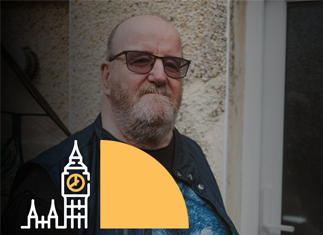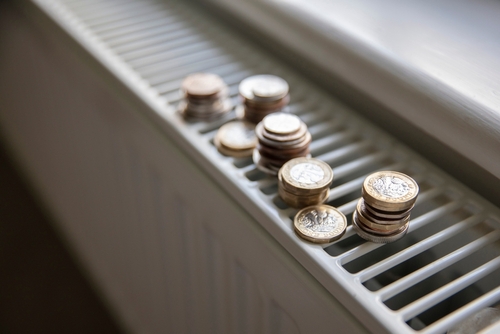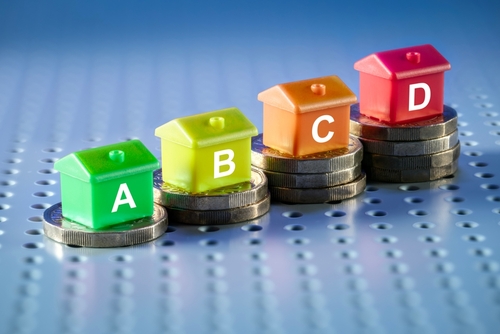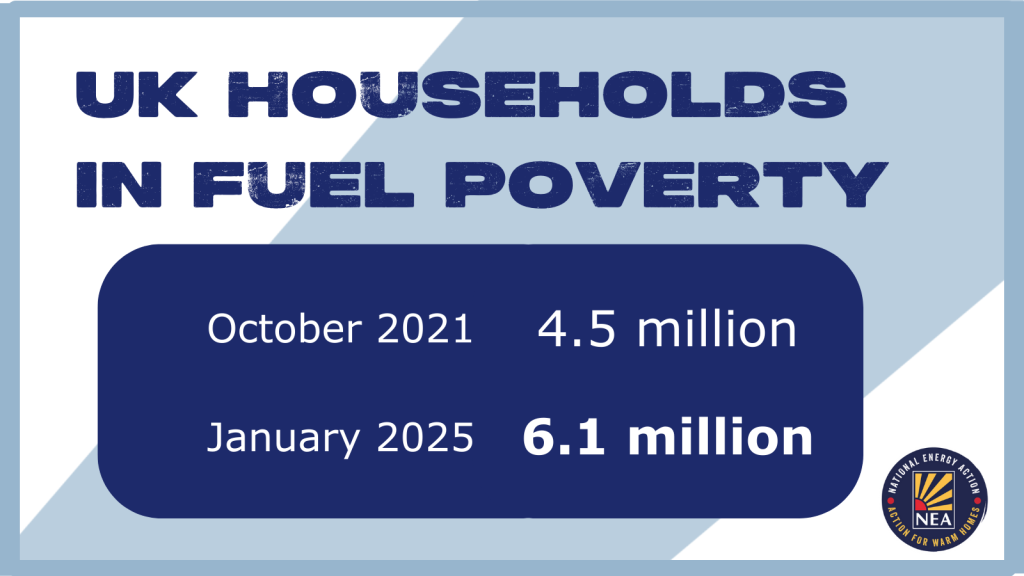
Energy Crisis
The energy crisis means millions of households are struggling to afford their energy bills and stay warm. In October 2021, 4.5 million UK households were in fuel poverty. As of 1 January 2025, there are 6.1 million.
Across the UK, cold homes are already damaging the lives of the poorest households.
Not coping strategies
We have spoken to households around the UK, who are being forced to adopt dangerous coping strategies. These can be detrimental to people’s health and wellbeing. Find out more here.


Fuel poverty statistics explainer
Since the winter period of 2020-21 energy prices have soared from an average of £1,042 to now being £1,738 for a typical household. It’s estimated 6.1 million UK households are now living in fuel poverty.

How you can make a difference
As you are probably aware, we are in the midst of an energy crisis and you can make a difference by getting in contact with your MP.
We estimate that 6.1 million UK households are now in fuel poverty.

Advice on how to save energy
National Energy Action has developed a series of multi-lingual information leaflets to provide advice on how to save energy.
Leaflets include a home energy checklist, advice on electrical appliances and dealing with damp and condensation, among other topics.

Improving the energy efficiency of rented accommodation
We have known for too many years the worst conditions remain in the Private Rented Sector (PRS). Worrying recent evidence suggests any limited progress is now being reversed. This briefing explains the severe consequences of this.
Last updated January 2025
How much is the typical annual energy bill?
As of 1 January 2025, the typical household pays £1,738 a year. National Energy Action’s figures show there are 6.1 million UK households in fuel poverty.
Data obtained from the University of Salford’s Energy House and published by National Energy Action shows how much it really costs to keep your home at a safe temperature.
Cost-of-living payments totalling £900 for households receiving means-tested benefits and £150 for those in receipt of disability benefits ended in April. This cut to income is not offset by the slight reduction in energy bills.
Further exacerbating the situation are the increases in the standing charge, which households pay regardless of how much energy they use and tends to make up a higher proportion of fuel poor households’ bills.

What has the UK Government done to support people with energy bills?
Energy bill support
- Cost-of-living payments – these will be spread throughout 2023-24 in several payments totalling £900 for people on means tested benefits, £300 to pensioners, £150 to households with disabilities. This has now ended as of April 2024.
- £1 billion funding increase to Household Support Fund for local authorities to support those in need. This has been extended by a further six months beyond April 2024.
Uprating benefits
- Households on Universal Credit and other legacy benefits will see an increase in these benefits in line with inflation
Energy efficiency
- Announced a target by 2030 cut demand by 15%, to achieve collective bill savings of £28 billion and £450 off household bills
- £6.6bn for energy efficiency committed in this parliament.
- New funding from 2025 of a further £6 billion.
What has the Welsh Government done to support people with their energy bills?
In Wales, the Welsh Government provided an expanded package of targeted support in 2022/23 to help tackle the crisis.
This included an expanded £200 Welsh Fuel Support Scheme payment to help towards energy bills, regardless of how households pay for their energy and whether they use on-grid or off-grid fuels. Eligible households needed to claim this via their local council between 26 September 2022 and 28 February 2023.
A Wales-wide Fuel Voucher Scheme is still available. This is run in partnership with the Fuel Bank Foundation and is designed to help households in crisis who must pay for their energy in advance (on or off-grid fuels). Households may contact Advicelink Cymru on 0800 702 2020 to find out more.
Households in financial hardship can continue to apply for emergency assistance payments under the Welsh Government’s Discretionary Assistance Fund (DAF). This includes help to top-up gas and electricity prepayment meters, or oil and LPG. Visit gov.wales/discretionary-assistance-fund-daf for more details.
Our asks of the UK Government to help with the energy crisis
- Ensure announced support reaches those who need it.
- Despite the significant packages of support to date, National Energy Action believes there is still a need to increase financial support for the poorest households.
- Make the energy market fairer: introduce a social tariff for energy
- Help low-income households to clear utility debts through a new payment matching scheme, where the UK Government matches every pound that a household makes towards their utility debt repayments.
- Improve energy efficiency:
- Committing the remainder of the funding promised to upgrade fuel poor homes in the Conservative Party Manifesto – an increase of £1.4 billion into the Home Upgrade Grant Scheme to be spent before the end of this parliament.
- Setting tighter regulatory minimum energy efficiency standards for rented properties, so that they reach EPC C by 2030 at the latest.
What is the price cap?
The energy price cap puts an upper limit on the unit rate that suppliers can charge customers on default tariffs (also known as standard variable tariffs). It was introduced by the government and is administered and calculated by the energy regulator Ofgem. It applies to default energy tariffs, whether paid by direct debit, standard credit or a prepayment meter. Prepayment meter customers pay more than direct debit customers. That’s because Ofgem says it is more expensive for suppliers to service them.
The price cap limits the rates a supplier can charge for their default tariffs. These include the standing charge and price for each kWh of electricity and gas. It does not cap the total bill, which will change depending on how much energy you use. But Ofgem presents it in terms of an average user’s annual bill, to simplify things for the general public.
Our fuel poverty estimate
Our definition of fuel poverty is that a household is in fuel poverty if it needs to spend 10% or more of its income on energy in order to maintain a satisfactory heating regime. This gives a realistic picture of the scale of fuel poverty in periods of more volatile energy prices. The government’s estimates for England are based on the efficiency of homes, which is not sensitive to changes in energy prices. Our projections are broadly in line with robust analysis by the Resolution Foundation surrounding ‘fuel stress’. This is also based on the 10% fuel poverty metric, but for England only.
How did the energy crisis unfold?
To read about how we got to this point, please click here.
Standing charge
To find out more about the standing charge, please click here.
Where can I get help now?
If you or someone you know can’t afford to heat their home then we’re here to help. We offer a range of advice and support directly to people in need. We also offer help via frontline workers and other intermediaries. For advice and support on what you can do click here. Also, contact your energy supplier. You may also be entitled to access the Local Authority Assistance Fund or Winter Fuel Support Scheme in Wales.
For media enquiries please contact anna.cook@nea.org.uk

